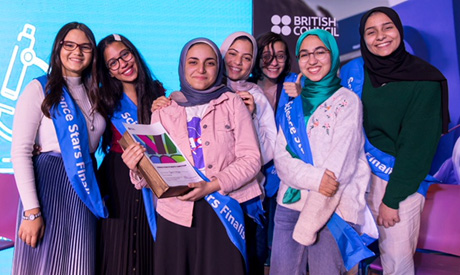
Winner Reem Haitham with participants in British Council's Science Stars competition (Photo courtesy of the British Council)
The British Council celebrated the top three winners of its first National Science Stars Competition Thursday, at its head office in Agouza, in the presence of Alex Lambert, deputy director of the British Council, Professor Yehia Bahei El-Din, the founding director of the Centre for Advanced Materials at the British University in Egypt (BUE), British Council staff, and teachers, school leaders and parents from Greater Cairo, Alexandria and Mansoura.
Eight out of the 10 shortlisted students in the finals were females. The three winners — Reem Haitham from Salahaldin International School in Alexandria, Omar Tarek from Al-Bashayer International School, and Gana Sherif from Summits International Schools — all received an internship in the Department of Science of the British University in Egypt.
A total of 125 students from 28 schools participated in the competition. The three-minute winning presentations included simple, clear and creative ways to describe complicated scientific concepts like matter and antimatter and black holes.
The competition was launched by British Council in Egypt as a student engagement programme designed to drive students’ passion for science, cultivate their skills in science communication, and drive a conversation among the general public around science.
Lambert said: “The British Council has already been fostering science communication for over 10 years in Egypt through Famelab, a competition targeting older science enthusiasts, which even lead to job creation for our participants. And this year, we are proud of Science Stars’ young talent, who were inspiring ambassadors of their schools today.”
“Science communication is like the gatekeeper who lets people into the lab and scientists inside of it to engage with the public. It is the bridge between both worlds, and it is important, because non-scientific people deserve to know how science affects their world,” said Nour Fawzy, participant and student at Salahaldin International School in Alexandria.
During the ceremony, the head of exams business development at the British Council in Egypt, Yasser Ali, thanked teachers for imbibing a passion for learning in students.
“Studies show that curiosity boosts levels of mental and physical energy. Not only are our science stars growing through this programme, but everyone in the audience today became curious about a scientific concept; some of them even googled anti-matter, the topic of Reem Haitham’s presentation. This is our larger purpose: to get regular people curious about science,” Ali added.
The British Council supports its partner schools with administrative and operative roles as it liaises between awarding bodies (Pearson Edexcel, Oxford, and Cambridge) and two Egyptian relevant ministries, ensuring the integrity of the exams system at every stage. It also actively supports teachers’ development and with school activities enhancing educational knowledge.
It connects schools with governing authorities, as well as with the latest teaching and learning techniques, through networking events like the global Schools Now! initiative, and also a conference, which will be held in Egypt this year in the presence of Minister of Education Tarek Shawky and over 300 delegates from around the world.
The fifth Schools Now! conference takes place 4-5 March 2020 in Cairo.
Short link: